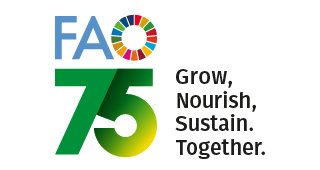World Food Day 2020: Grow, nourish, sustain. Together.

World Food Day is observed every year on 16 October in remembrance of the day when the Food and Agricultural Organisation (FAO) of the United Nations was founded in 1945. The primary focus is to tackle global hunger and strive to eradicate hunger across the world. The day is celebrated by all UN member states, which includes India.
Collective action across 150 countries is what makes World Food Day one of the most celebrated days of the UN calendar. Hundreds of events and outreach activities bring together governments, businesses, NGOs, the media, and general public. They promote worldwide awareness and action for those who suffer from hunger and for the need to ensure healthy diets for all.
World Food Day 2020 marks the 75th anniversary of FAO in an exceptional moment as countries around the world deal with the widespread effects of the global COVID-19 pandemic.
The COVID-19 global health crisis has been a time to reflect on things we truly cherish and our most basic needs. These uncertain times have made many of us rekindle our appreciation for a thing that some take for granted and many go without: food.
Food is the essence of life and the bedrock of our cultures and communities. Preserving access to safe and nutritious food is and will continue to be an essential part of the response to the COVID-19 pandemic, particularly for poor and vulnerable communities, who are hit hardest by the it and resulting economic shocks.
In a moment like this, it is more important than ever to recognise the need to support our food heroes - farmers and workers throughout the food system - who are making sure that food makes its way from farm to fork even amid disruptions as unprecedented as the current COVID-19 crisis.
#WorldFoodDay is launching a call for global solidarity to help the most vulnerable people to recover and make food systems more sustainable, stronger and resilient to shocks.
Digital technologies are keys to transforming the way food is produced, processed, traded and consumed and building more resilient and robust food systems. They have the potential to close the great digital gap between developed and developing countries, cities and rural areas, men and women, young and old. But digitalization is a distant reality for over 3 billion people in the world who lack access to internet, most of whom live in rural and remote areas.
New technologies promise revolutionary changes for smallholder farmers. This includes satellite imaging, remote sensing as well as mobile and block chain Apps with the potential to optimize food chains, increase access to nutritious foods, reduce food loss and waste, improve water management, fight against pests and diseases, monitor forests or prepare farmers for disasters. Intensive training to enhance farmers’ digital skills, and giving voice to their needs and ideas, will be essential, as well as incentives to encourage the production of nutritious and diverse food.
Improved data analysis will also help governments in developing countries to make better decisions. FAO is ready to support countries as they identify partnerships to make this a reality, including investment opportunities from the private sector. This will be crucial to build the necessary infrastructure - broadband connections, data service providers – and to host data centres or cloud platforms that support big databases with vital information.
In recent decades the world has made significant progress in improving agricultural productivity. Although we now produce more than enough food to feed everyone, our food systems are out of balance. Hunger, obesity, environmental degradation, loss of agro-biological diversity, food loss and waste and a lack of security for food chain workers are only some of the issues that underline this imbalance. As countries begin to develop and implement COVID-19 recovery plans, it is an opportunity to adopt innovative solutions based on scientific evidence so they can build back better and improve food systems, making them more resistant to shocks.
Breakthrough digital technologies have the potential to deliver significant positive impacts across food value chains. These range from innovations that can make food systems more resource-efficient and climate-resilient such as precision agriculture, gene-editing and biological-based crop protection, or technologies that improve traceability from farm to fork.
Harnessing Digital Technologies to Improve Food System Outcomes looks at the opportunities from digital technologies, including better transparency of agricultural value chains, smarter farms, and improved public services.
The World Band Reiterates:
Digital technologies can significantly reduce the costs of linking sellers and buyers; reduce inequalities in access to information, knowledge, technologies and markets; help farmers make more precise decisions on resource management by providing, processing, and analysing an increasing amount of data faster; and potentially reduce scale economies in agriculture, thereby making small-scale producers more competitive.
A range of digital technologies in the food system are already leading to better informed and engaged consumers and producers, smarter farms and improved public services. These technologies range from simple off-line farmer advisory digital videos to complex systems such as distributed ledger technologies for value chain traceability and some forms of precision agriculture.
Adoption of digital technologies varies significantly across countries, with lower current adoption rates in low-income countries. Increasing its adoption in the food system will require addressing supply side factors such as low rural network coverage and availability of digital application; and demand side factors, including need for better skills and knowledge, trust, affordability, and the absence of complementary investments.
While digital technologies have significant potential they also pose several risks, including an over-concentration of service providers; lack of data privacy; exclusion and potential job losses for some activities; and cyber security breaches. What’s needed are to: keep service provider entry barriers low; ensure good data governance; targeted support to smallholder farmers, youth, women, and other vulnerable groups; and support skill development.
Digital technologies should not be viewed as a panacea even while they offer significant opportunities. Other investments such as better roads, uninterrupted electricity, post-harvest storage facilities, and better logistics linking farmers to markets are equally important. Better investment climate and government policies will in turn increase demand for digital technologies.
To mark the long-standing relation of India with Food and Agriculture Organisation, Prime Minister Narendra Modi will release a commemorative coin of ₹75 denomination on the occasion of 75th Anniversary of FAO on 16 October.
Issuing a statement, the Prime Minister's Office said that PM Modi will also dedicate to the nation 17 recently developed biofortified varieties of eight crops.
The occasion marks the highest priority accorded by the government to agriculture and nutrition, and is a testament of the resolve to completely eliminate hunger, undernourishment and malnutrition.
It will be witnessed by Anganwadis, Krishi Vigyan Kendras, Organic and Horticulture Missions across the country. Union Agriculture Minister, Finance Minister and Women and Child Development (WCD) Minister will also be present on the occasion.
"The journey of FAO in making the vulnerable classes and masses stronger, economically and nutritionally, has been unparalleled. India has had a historic association with FAO. Indian Civil Service Officer Dr Binay Ranjan Sen was the Director General of FAO during 1956-1967. The World Food Programme, which has won the Nobel Peace Prize 2020, was established during his time. India's proposals for the International Year of Pulses in 2016 and the International Year of Millets 2023 have also been endorsed by FAO," the PMO added.
World Food Day is calling for global solidarity to help all populations, and especially the most vulnerable, to recover from the crisis, and to make food systems more resilient and robust so they can withstand increasing volatility and climate shocks, deliver affordable and sustainable healthy diets for all, and decent livelihoods for food system workers.
This will require improved social protection schemes and new opportunities offered through digitalization and e-commerce, but also more sustainable agricultural practices that preserve the Earth’s natural resources, our health, and the climate.















































